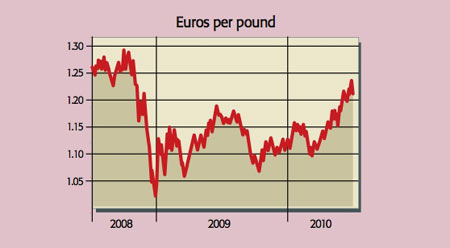
Some said a coalition government “would spell disaster” for the pound, says Mattew Goodburn on Citywire.co.uk. Yet last week the pound hit a 19-month high around €1.24 against the euro. Against the greenback it has jumped over the $1.50 mark, a two-month high. Chalk it up to an unexpectedly stable coalition and, most importantly, the tough budget. With forex markets concentrating on sovereign debt problems, the budget delivered “enough deficit-cutting policies to… ensure the UK’s triple-A rating is secure”, says Melinda Burgess of RBS.
So what next? As Steve Barrow of Standard Bank points out, “the factors that dominate the markets’ attention now are not the ones that will do so in future weeks and months”. As Burgess notes, the flipside of tough fiscal policy is usually loose monetary policy and slow growth, typically bad news for currencies.
If markets begin to perceive that Britain’s fiscal tightening is set to hamper the economy more than the Office of Budgetary Responsibility forecasts, then sterling could well suffer, says Hans Redeker of BNP Paribas; especially if the Bank of England is forced to consider reintroducing money printing. However, whether the focus is on growth and interest-rate prospects, or on budget deficit worries, there still appears to be scope for further sterling gains against the euro, given the bigger problems on the continent. Fears over the eurozone banking sector are unlikely to dissipate soon. Meanwhile, the impact of the fiscal squeeze in some European countries is set to be bigger than in Britain, says Capital Economics. The European Central bank may even have to start printing money. Expect “a further softening in the euro”. Capital Economics reckons sterling could reach €1.40 next year.
Against the dollar the picture is murkier. It may help the pound that poor recent data has chipped away at the greenback’s safe-haven status, says FAZ.net. That suggests global risk-aversion may not give the dollar as much of a lift against other currencies. America’s own fiscal problems could now come under the spotlight. What is clear, however, is that with the growing risk of a double-dip recession in the world economy – and hence the prospect of yet more money printing on both sides of the Atlantic – gold, the safest currency of all, looks more and more appealing.